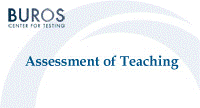Buros-Nebraska Series on Measurement and Testing

Assessment of Teaching: Purposes, Practices, and Implications for the Profession
Date of this Version
1990
Document Type
Article
Citation
From: Assessment of Teaching: Purposes, Practices, and Implications for the Profession, edited by James Y. Mitchell, Jr., Steven L. Wise, and Barbara S. Plake; Series Editor Jane Close Conoley (Hillsdale, New Jersey, Hove & London: Lawrence Erlbaum Associates, 1990)
Abstract
In performance assessment, the examinee is called upon to display behaviors or produce products which an observer evaluates in terms of pre-specified performance standards. This kind of measurement plays a major role in many school evaluation contexts, including both student and teacher evaluation. The observation and evaluation of a teacher's performance in the classroom represents one of many excellent sources of information on teacher capabilities and the effectiveness of instruction. The purpose of this chapter is to review the various ways performance assessment methodology can serve in teacher-assessment contexts.
The review begins with a summary of the range of settings in which the performance of prospective and practicing teachers might be assessed, identifying the various decisions to be made and the various data sources that inform those decisions. This review of decision contexts provides a sense of the various purposes for teacher assessment and the various measurement methods used to serve those purposes. Further, it frames the role of performance assessment in a very general way.
Next, the discussion turns to a description of the basic ingredients of a performance assessment, detailing the components of such assessments, discussing strategies for ensuring their quality, and reviewing the keys to their successful use. This description provides a sense of the range of performance assessment design alternatives available to the user.
Finally, the various purposes for teacher assessment are combined with the various performance assessment design alternatives to reveal how the two can be integrated to promote sound assessment leading to appropriate decisions in a wide range of contexts. This analysis permits an exploration of the fundamental differences in the kind of assessment methods used to achieve different purposes. In addition, it provides a means of examining strategies for ensuring valid and reliable performance assessment in each decision context.
Throughout the discussion, emphasis is placed on differentiating between sound and unsound assessment practices. The result is a detailed portrait of performance assessment at work in the arena of teacher assessment.
THE RANGE OF TEACHER ASSESSMENT CONTEXTS
There are many reasons why we assess teacher performance. Assessments inform decisions during teacher training, at the time of licensure and throughout the teacher's tenure in the classroom. In fact, we can identify at least eight specific decision contexts where assessment of teacher performance plays a role.
For instance, during preservice teacher education, instructors assess achievement within the specific courses, documenting the extent to which students have learned and are able to apply the pedagogical principles covered. Assuming that (a) the content of each course contributes to the development of a competent teacher and (b) course assessments cover the content taught, each course assessment verifies achievement of essential pedagogical knowledge and/or skills. Also during preservice training, faculty evaluate the performance of students as they participate in field experiences, such as their student teaching experience. Whether evaluating course achievement or student-teaching performance, the use of sound assessment methodology is very important. In either case, sound assessments are those that sample teacher performance in a representative manner according to clearly specified course outcome and/or classroom performance criteria.
Included in
Educational Administration and Supervision Commons, Educational Assessment, Evaluation, and Research Commons


Comments
Copyright © 1990 by Lawrence Erlbaum Associates, Inc. Digital Edition Copyright © 2012 Buros Center for Testing. This book may be downloaded, saved, and printed by an individual for their own use. No part of this book may be re-published, re-posted, or redistributed without written permission of the holder of copyright.